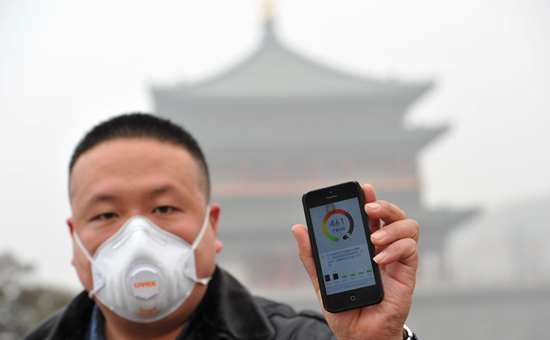Draft law: Clean up air or pay fine
 0 Comment(s)
0 Comment(s) Print
Print E-mail China Daily, January 16, 2014
E-mail China Daily, January 16, 2014
Local governments may face fines and administrative punishments if they fail to tackle air pollution, according to the latest draft of the Atmospheric Pollution Prevention Act.
The draft, proposed by the Ministry of Environmental Protection, will be submitted to the central government early this year before going to the National People's Congress, officials and experts said.
 |
|
The air quality index hit 461 as hazardous smog shrouded Xi'an, capital of northwest China's Shaanxi Province, on Dec. 18, 2013. [File photo] |
"Previous laws tended to have more requirements for enterprises than for governments," said Chai Fahe, vice-president of the Chinese Research Academy of Environmental Sciences, who worked on the draft. "What we are discussing now is how to punish the latter for weak management."
He said local governments that fail to meet emission reduction targets set by the central government, such as a 25 percent reduction of fine particles by 2017 from the 2012 levels set for Beijing, Tianjin and Hebei provinces could face punishment.
Liaoning in the northeast is the first province to fine city-level governments for causing air pollution.
In early December, eight cities were ordered to pay a combined 54.2 million yuan ($8.96 million) for emitting major pollutants in excess of the national standard between May 2012 and October 2013. The money will be used on air pollution control, the provincial authority said.
Wang Jian, deputy director of the Pollution Prevention and Control Department, said such measures remain controversial, although he recognized their positive role in management innovation.
Chai, on the other hand, said it was a move in the right direction.
"There are cases of local governments in foreign countries going broke, why can't we fine ours that are remiss?" he said.
He added that money collected in fines is spent on air pollution control, not for pay raises.
Ma Jun, director of the Institute of Public and Environmental Affairs, an NGO, acknowledged the measure as a possibly effective way of imposing economic sanctions, but emphasized that aside from Chai's worries, another two preconditions have to be met to make the measure work: the penalty has to be large, and the public should know how the money is used.
"The amount is not big enough in Liaoning's case," Ma said. "Compared with the investment of billions brought by polluting projects that local governments are trying to protect in most cases, 50 million is too little."





